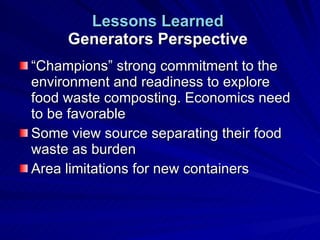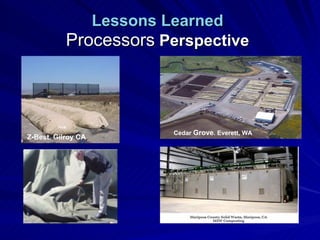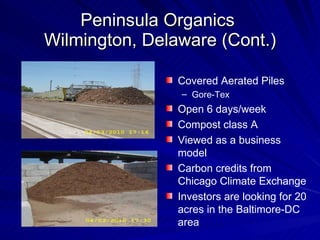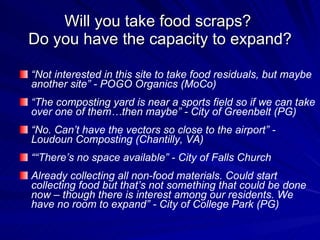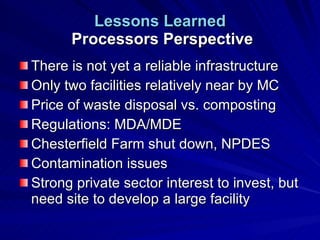Food Waste Composting - Montgomery County - Opportunities and Obstacles April, 2011
- 1. Food Waste Composting Montgomery County Opportunities and Obstacles April, 2011
- 2. Agenda How much food waste? Food waste composting perspectives: Generators Processors Collector MoCo food waste pilot project
- 3. How much food waste?
- 5. Target Generators Percent of food waste in solid waste stream: Restaurants (80%), supermarkets (73%), Education (60%) Estimated tonnages generated by non-residential sector: Restaurants: 28,769 tons Supermarkets: 14,014 tons MCPS Schools: 5,301 tons
- 6. Food Waste Composting Perspectives Generators Processors: Receiving facilities Collectors: Hauling companies
- 7. Lessons Learned Generators Perspective “Champions” strong commitment to the environment and readiness to explore food waste composting. Economics need to be favorable Some view source separating their food waste as burden Area limitations for new containers
- 8. Food Waste Composting Perspectives Generators Processors: Receiving facilities Collectors: Hauling companies
- 9. Lessons Learned Processors Perspective Cedar Grove . Everett, WA Cedar Grove . Everett, WA Z-Best. Gilroy CA Cedar Grove . Everett, WA
- 10. Lessons Learned Processors Perspective Advantages: More process control (temperature) Less odor, leachate, vermin Easier regulatory compliance Short composting time Better product quality Fewer operational staff Small footprint Disadvantages: Higher Capital Costs (preliminary info) Private sector is participating actively
- 11. Regional and Local Food Waste Composters Transfer Station
- 12. McGill Sussex Facility, Waverly, VA Enclosed System Area: 20 Acres Throughput: 130,000 t/y Current: 180 t/d Fee: $10 - $20 (food waste) Open: 2005 Open 6 days/week 300,000 cy soil builder Investment: $20 M + land Pre and post consumer food Looking for a location in DC area
- 13. Peninsula Organics Wilmington, Delaware Area: 27 Acres Capacity 250 t/d Current: 180 t/d Investment: $20 M Distance from MC: 113 miles Fee: $32 - $45 (food waste) Open: Dec, 2009 Contamination: No mandatory recycling Delaware
- 14. Peninsula Organics Wilmington, Delaware (Cont.) Covered Aerated Piles Gore-Tex Open 6 days/week Compost class A Viewed as a business model Carbon credits from Chicago Climate Exchange Investors are looking for 20 acres in the Baltimore-DC area
- 15. Recycled Green Carroll County Area: 30 Acres Throughput: 150 – 175 t/d Fee: $45 - $55 (food waste) 3.5 years of operation Distance: 25 miles from MC Open 6 days/week Compost class A Bates: main hauler Pre and post consumer food Plastic contamination No odors complaints No NOVs
- 16. TopSoil ETC., Inc Curtis Bay MD Distance from MC: 46 miles Area: 14 acres Processing: 20 t/d Fee: $45 (food waste) 1 year of operation Main issue: quality of material Open 6 days/week Capacity 500 t/d (278 t/d) Future investment: 3.8 M Haulers: WM and Bates
- 17. Will you take food scraps? Do you have the capacity to expand? “ Want to expand one more acre and are interested in accepting food residuals” - Arlington County We are exploring adding food waste to the composting operation. - Prince George’s County *The Institute for Local Self-Reliance, phone survey, April, 2010
- 18. Will you take food scraps? Do you have the capacity to expand? “ Not interested in this site to take food residuals, but maybe another site” - POGO Organics (MoCo) “ The composting yard is near a sports field so if we can take over one of them…then maybe” - City of Greenbelt (PG) “ No. Can’t have the vectors so close to the airport” - Loudoun Composting (Chantilly, VA) ““ There’s no space available” - City of Falls Church Already collecting all non-food materials. Could start collecting food but that’s not something that could be done now – though there is interest among our residents. We have no room to expand” - City of College Park (PG)
- 19. Will you take food scraps? Do you have the capacity to expand? There is some existing capacity for grass and leaves, maybe 5-10K more per year” - Prince William County “ Trying to expand but it’s a cost issue. Want to collect more yard waste and have put out an RFP’ - City of Alexandria “ Can expand by promoting more backyard composting”- City of Manassas “ Considering options so we could expand to year-round yard trim collection”- District of Columbia
- 20. Lessons Learned Processors Perspective There is not yet a reliable infrastructure Only two facilities relatively near by MC Price of waste disposal vs. composting Regulations: MDA/MDE Chesterfield Farm shut down, NPDES Contamination issues Strong private sector interest to invest, but need site to develop a large facility
- 21. Food Waste Composting Perspectives Generators Processors: Receiving facilities Collectors: Hauling companies
- 22. Lessons Learned Collectors Perspective Organic-niche hauling companies “ Fastest growing line of business” Hauling Economics Geography proximate to composting facility – 25 mile radius Cost optimization Route density Transfer station (consolidate load for longer haul) Largest economic savings should come from trash services level e.g. size of dumpster, frequency of pulls It is a challenge in MC where different collector services providers for trash/recycling / Source Separated Organics (SSO) Trash collection fees compete with SSO collection and recovery
- 23. Lessons Learned Collectors Perspective Challenges Contamination of Source Separate Organics Quality of pre-consumer material is more consistent than post-consumer Education of generating site employees High staff turnover rates Distance to receiving facilities Quick degradation of material Service must be provided on a more frequent/regular schedule Diversity of establishments
- 24. Montgomery County Food Waste Pilot Project Purpose To implement successful non-residential sector food waste composting program To set up a model demonstration project that can be emulated by other businesses in the County To lead by example Test Aspects Acceptable materials Container options, storage area standards Collection frequency, schedule, location Transportation and equipment Outreach, education and training needs Reporting requirements Permit and licensing requirements
Editor's Notes
- Approximately 4,000 ton were composted in FY 2010 (champions such as Whole foods, private schools, etc)
- Schools; 0.35 Lbs/meal Inmates; 1 lb/day Supermarket; 3,000 lbs/employee/year Fast food and full restaurants: 4250 lb/employee/year It does not include: Private schools, colleges, universities, institutions, retailers, hotels
- SSO; securing a supply commercial SSO materials
- SSO; securing a supply commercial SSO materials
- Z-Best facility: windrows are 10-14 feet in diameter and 350 feet in length Cedar grove facility: Design capacity 160,000. It is ISO 14001 certified
- Distance from MC 120 miles
- Next door landfill $81 /ton
- MDA/MDA some processors say is like having 2 road maps that do not aligned” MDE: discharge permit MDA: compost as a product
- SSO; securing a supply commercial SSO materials






